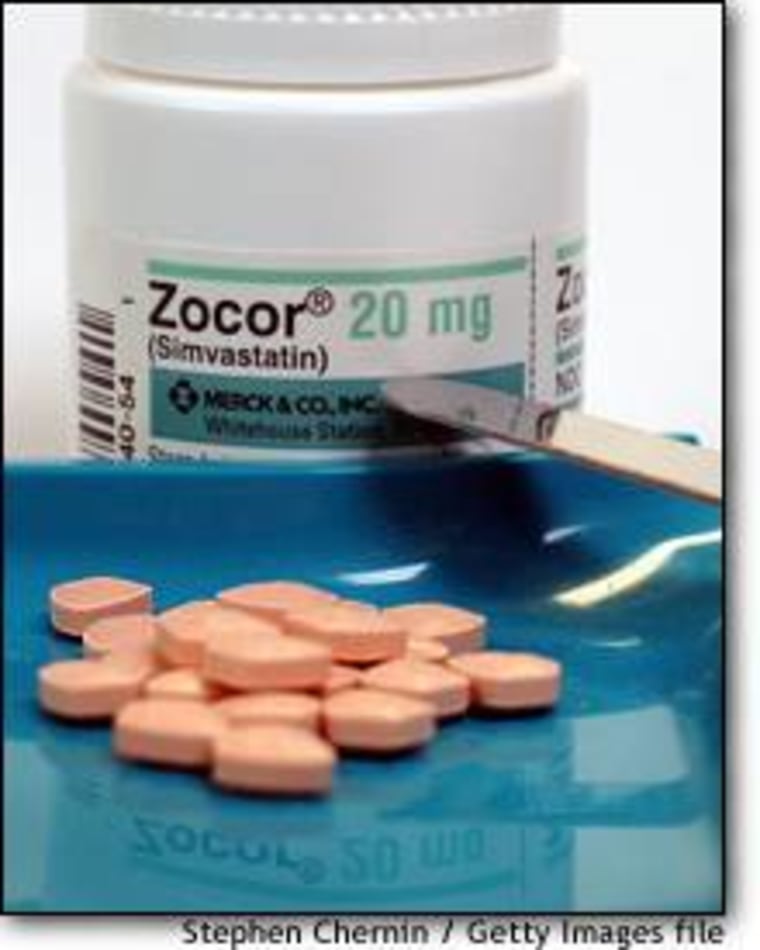Initial studies linking cholesterol to Alzheimer’s disease were intriguing. And later reports showing that cholesterol-lowering drugs, known as statins, might help prevent Alzheimer’s were downright attention grabbing. So why aren’t doctors suggesting that all elderly patients start up a course of Lipitor or Zocor to help stave off the mind-robbing disease?
Scientists have even come up with a possible explanation of how statins might impact Alzheimer’s. Studies have shown that the drugs may cut the production of a protein that leads to the waxy deposits that clog the brains of Alzheimer’s patients.
But, even though the reports are promising, none actually prove that statins prevent, delay or slow Alzheimer’s disease, says Dr. Jose Luchsinger, an assistant professor of medicine at the Taub Institute for Research on Alzheimer’s Disease and the Aging Brain at Columbia Presbyterian Medical Center.
And these days doctors, still smarting from the lessons learned during the hormone replacement debacle, are much more cautious about prescribing medications without proof that the drugs actually work, Luchsinger says.
Large clinical trials needed
In many ways, the statin-Alzheimer’s story appears to be at the same stage that estrogen was 5 years ago.
As was the case with estrogen, there are currently strong observational studies showing that the drug has a beneficial effect. For example, a study published in 2002 showed that the risk of developing Alzheimer’s disease could be cut by as much as 79 percent when patients took one of the statin drugs.
But observational studies have their limitations. In this type of study, researchers round up a group of patients who have been taking a drug, a statin in this case, and a group of similar patients who are not taking the drug. Then they compare the two groups.
But what no one knows is whether the patients who took statins had something besides the medication in common. It’s possible that they were healthier to start out with. Or perhaps they exercised more or ate a better diet.
The only way around this problem is for researchers to devise large clinical trials in which patients are randomly assigned to receive either statins or a placebo.
Right now there are ongoing trials designed to do exactly this. Dr. Mary Sano, an investigator at the Mount Sinai School of Medicine is heading up one of those studies.
Compelling evidence
While the clinical trials are an absolute must, Sano believes that some of the evidence collected thus far is compelling.
“The most convincing data comes from the animal studies,” Sano says. Animal studies have shown that statins may cut the buildup of a protein that leads to the waxy deposits that clog the brains of Alzheimer’s patients.
Other research has shown that by feeding animals a diet high in cholesterol, you can increase the number of waxy plaques that form in the brain.
“If you lower the cholesterol in an animal’s diet, there are fewer plaques,” Sano says. “If you raise the cholesterol, but also give a statin, then the you still get fewer plaques.”
There are other lines of evidence suggesting that cholesterol might play a role in the development of Alzheimer’s. One recently published report found that people with a certain variation of a gene, known as CYP46, that encodes for cholesterol were at an increased risk for developing late-onset Alzheimer’s.
This brings the number of cholesterol-related genes linked to Alzheimer’s to two. Scientists had previously found a variant of the apoE gene, which makes a protein that binds to cholesterol, to be linked to Alzheimer’s disease.
As it turns out, the brain also makes it’s own form of cholesterol, which is called 24S-hydroxycholesterol. And a study published in April showed that statins could lower the levels of this substance.
Other research has shown that Alzheimer’s patients tend to have high levels of 24S-hydroxycholesterol, says study co-author Dr. Myron Weiner, a professor of psychiatry at the University of Texas Southwestern Medical Center in Dallas.
In theory, Weiner says, you don’t get the formation of plaques when there’s no cholesterol. “So if you reduce the amount of cholesterol in the brain you should be able to reduce plaque formation.”
Will statins slow the disease?
One problem that the new studies may not be able to surmount is the fact that it takes years for Alzheimer’s disease to develop. That’s why the clinical trials will involve people who already have Alzheimer’s — the goal is to determine whether statins will slow the disease.
But, says Luchsinger, even if the drugs don’t slow Alzheimer’s progression, they might stop the disease from developing if taken early enough. But to test this hypothesis, a study would need to go on for 20 or 30 years.
That’s where the analogy with hormone replacement therapy fails. Unlike estrogen, which hasn’t been proven to do anything beyond alleviating menopausal symptoms, such as hot flashes, statins have been shown to reduce cholesterol and prevent heart attacks. So there’s already another health benefit to taking the drug.
“We may never know the answer as to whether there is an association between these drugs and Alzheimer’s disease,” Luchsinger says. “But the bottom line is that we will still be using them widely for other reasons, regardless of what happens with dementia.”
Linda Carroll is a free-lance reporter based in New Jersey. Her work has appeared in The New York Times, Health and Smart Money.
